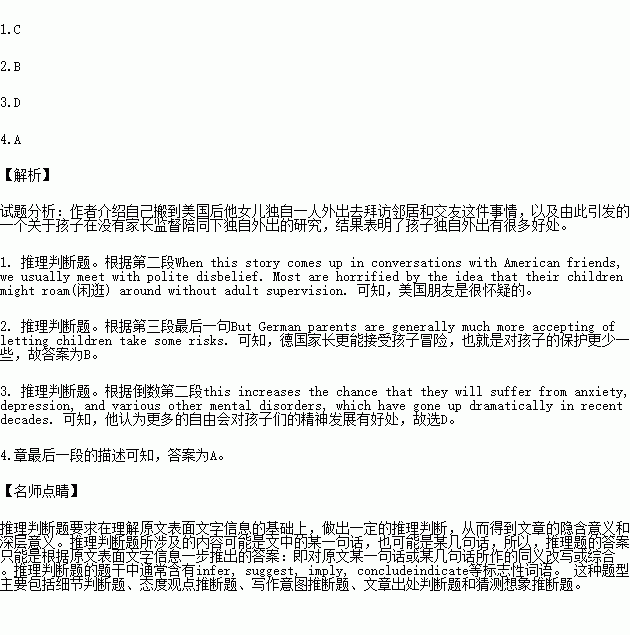题目内容
On her first morning in America last summer, my daughter went out to explore her new neighborhood alone, without even telling my wife or me. Of course we were worried; we had just moved from Berlin, and she was just 8. But when she came home, we realized we had no reason to panic. Beaming with pride, she told us how she had discovered the little park around the corner, and had made friends with a few local dog owners.
When this story comes up in conversations with American friends, we usually meet with polite disbelief. Most are horrified by the idea that their children might roam(闲逛) around without adult supervision.
A study by the University of California has found that American kids spend 90 per cent of their leisure time at home, often in front of the TV or playing video games. Such narrowing of children's world has happened across the developed world. But German parents are generally much more accepting of letting children take some risks.
“We are depriving(剥夺) them of opportunities to learn how to take control of their own lives,” writes Peter Gray, a research professor at Boston College. He argues that this increases the chance that they will suffer from anxiety, depression, and various other mental disorders, which have gone up dramatically in recent decades.
I am no psychologist like Professor Gray, but I know I won't be around forever to protect my girls from the challenges life holds in store for them. And by giving kids more control over their lives, they learn to have more confidence in their own capabilities.
1.Hearing the author's daughter exploring the new neighborhood alone, his American friends feel ________.
A. worriedB. proudC. doubtfulD. terrified
2.We can conclude from Paragraph 3 that ________.
A. American kids enjoy playing at home
B. German parents are less protective than American parents
C. German kids like taking risks more than American kids
D. American parents don't limit their children's activities in their leisure time
3.It's implied from Professor Gray's words that ________.
A. parents should always be around their children to protect them from risks
B. more and more parents suffer from mental problems
C. children are having more opportunities to take control of their lives
D. giving children more freedom is beneficial to their mental development
4.Which of the following words can best describe the author's parenting?
A. Open-minded.B. Irresponsible.C. Careless.D. Protective.

